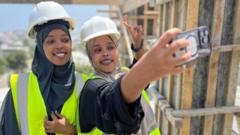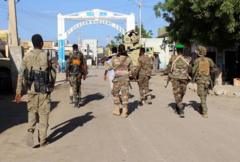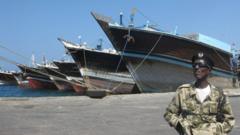Despite challenges, women like Fathi Mohamed Abdi and Saadia Ahmed Omar are leading a construction revolution in Mogadishu, symbolizing hope in a once war-torn city.
**Rising Resilience: Women Powering Mogadishu's Construction Boom**

**Rising Resilience: Women Powering Mogadishu's Construction Boom**
As Somalia's capital transforms, female engineers are breaking barriers and reshaping the skyline.
Mogadishu is witnessing an unprecedented construction boom, transforming its landscape and providing unexpected opportunities for women in engineering. Among the pioneers of this movement are Fathi Mohamed Abdi and Saadia Ahmed Omar, two young female engineers at the forefront of numerous multimillion-dollar projects.
At just 24 years old, both women navigate a traditionally male-dominated field, overseeing the construction of a multi-floor apartment complex in the Hodan District of the city. "When I first started, people questioned my ability," recalls Ms. Abdi, the chief operating officer of Arkan Engineering Services. "They wondered how a young woman could be entrusted with such significant projects."
Driven by a desire to revive their homeland, both Ms. Abdi and Ms. Omar, who have been practicing for five years, reflect on their childhood experiences during Somalia's civil unrest. "Mogadishu needs us," Ms. Omar emphasizes, highlighting their commitment to rebuilding despite ongoing threats from insurgents like al-Shabab.
In the past five years, Mogadishu has seen over 6,000 new buildings erected—signs of growth and rehabilitation following decades of war. Ibrahim Abdi Heyle, head of the Somali Engineers Association, notes that the demand for successful infrastructures has opened doors for women, asserting their crucial role in addressing labor shortages in engineering.
Nevertheless, challenges remain fierce. Women constitute only 5% of the engineering workforce in Somalia, and access to mentorship is limited. "During my search for internships, I faced many rejections," says Ms. Omar, who eventually found an opportunity after much perseverance. “Our efforts now create a new image of women in engineering in Mogadishu,” she adds.
The city's rapid reconstruction, however, is not above scrutiny. Concerns about the loss of Mogadishu's historical character loom, as developers favor modern skyscrapers over traditional architecture. Veteran architect Siidow Cabdulle Boolaay laments the potential disappearance of the city's unique Italian-style designs, cautioning about the materials used in construction and the resultant safety standards.
Yet amidst this transformation, local officials insist on maintaining quality control in building regulations, although fears linger about the speed of progress outpacing safety practices. “The government is introducing measures to ensure buildings are safe and compliant,” explains Salah Hassan Omar, a spokesperson from the mayor's office.
While the booming urban development is fueled by remittances and improvements in security, environmental challenges also surface. UN climate adviser Christophe Hodder warns of potential crises stemming from unregulated water drilling and sewage systems, stressing the need for sustainable urban management.
Despite these hurdles, Abdi and Omar represent the resilient spirit of a new generation of Somali engineers. They aspire to see Mogadishu evolve into a modern urban center capable of setting an example for other post-conflict regions. "Every building I helped to construct is a step toward regeneration,” Ms. Abdi states proudly, echoing her belief that they not only create structures but also reshape narratives of hope and possibility for women in Somalia.
As Mogadishu continues its urban renaissance, the city holds promise for future generations, affirming that from the rubble of the past, a new and inspiring Mogadishu is rising—built by women who persist against the odds.
At just 24 years old, both women navigate a traditionally male-dominated field, overseeing the construction of a multi-floor apartment complex in the Hodan District of the city. "When I first started, people questioned my ability," recalls Ms. Abdi, the chief operating officer of Arkan Engineering Services. "They wondered how a young woman could be entrusted with such significant projects."
Driven by a desire to revive their homeland, both Ms. Abdi and Ms. Omar, who have been practicing for five years, reflect on their childhood experiences during Somalia's civil unrest. "Mogadishu needs us," Ms. Omar emphasizes, highlighting their commitment to rebuilding despite ongoing threats from insurgents like al-Shabab.
In the past five years, Mogadishu has seen over 6,000 new buildings erected—signs of growth and rehabilitation following decades of war. Ibrahim Abdi Heyle, head of the Somali Engineers Association, notes that the demand for successful infrastructures has opened doors for women, asserting their crucial role in addressing labor shortages in engineering.
Nevertheless, challenges remain fierce. Women constitute only 5% of the engineering workforce in Somalia, and access to mentorship is limited. "During my search for internships, I faced many rejections," says Ms. Omar, who eventually found an opportunity after much perseverance. “Our efforts now create a new image of women in engineering in Mogadishu,” she adds.
The city's rapid reconstruction, however, is not above scrutiny. Concerns about the loss of Mogadishu's historical character loom, as developers favor modern skyscrapers over traditional architecture. Veteran architect Siidow Cabdulle Boolaay laments the potential disappearance of the city's unique Italian-style designs, cautioning about the materials used in construction and the resultant safety standards.
Yet amidst this transformation, local officials insist on maintaining quality control in building regulations, although fears linger about the speed of progress outpacing safety practices. “The government is introducing measures to ensure buildings are safe and compliant,” explains Salah Hassan Omar, a spokesperson from the mayor's office.
While the booming urban development is fueled by remittances and improvements in security, environmental challenges also surface. UN climate adviser Christophe Hodder warns of potential crises stemming from unregulated water drilling and sewage systems, stressing the need for sustainable urban management.
Despite these hurdles, Abdi and Omar represent the resilient spirit of a new generation of Somali engineers. They aspire to see Mogadishu evolve into a modern urban center capable of setting an example for other post-conflict regions. "Every building I helped to construct is a step toward regeneration,” Ms. Abdi states proudly, echoing her belief that they not only create structures but also reshape narratives of hope and possibility for women in Somalia.
As Mogadishu continues its urban renaissance, the city holds promise for future generations, affirming that from the rubble of the past, a new and inspiring Mogadishu is rising—built by women who persist against the odds.




















